Anthony and Cleopatra is exactly the kind of repertory piece that people look forward to during the Holland Festival, or any other prestigious stage. Director and writer Tiago Rodrigues manages not so much to deflate that grandiose expectation as to reduce it to the intimacy of a duet and a play with extremely elementary theatrical gestures. His two actors are dancers, an experienced choreographer duo besides, and also each other's sweetheart for a long time.
Instead of Shakespeare's dramatic love story, played out along the lines of power, ambition and tragic self-loss, Rodrigues, together with Sofia Dias and Vitor Roriz, has created a wonderfully understated and embodied language play. It is about losing yourself very slowly in the other or perhaps just not. Observation and subtle, indirect forms of dialogue play the leading role, between the players and in relation to the audience. The confrontational politics of great leaders ultimately falling down - Shakespeare's theme - is replaced by a smaller-scale, choreographic circling, in text and movement, around human distance and proximity, individual control, and the choice of different forms of surrender.
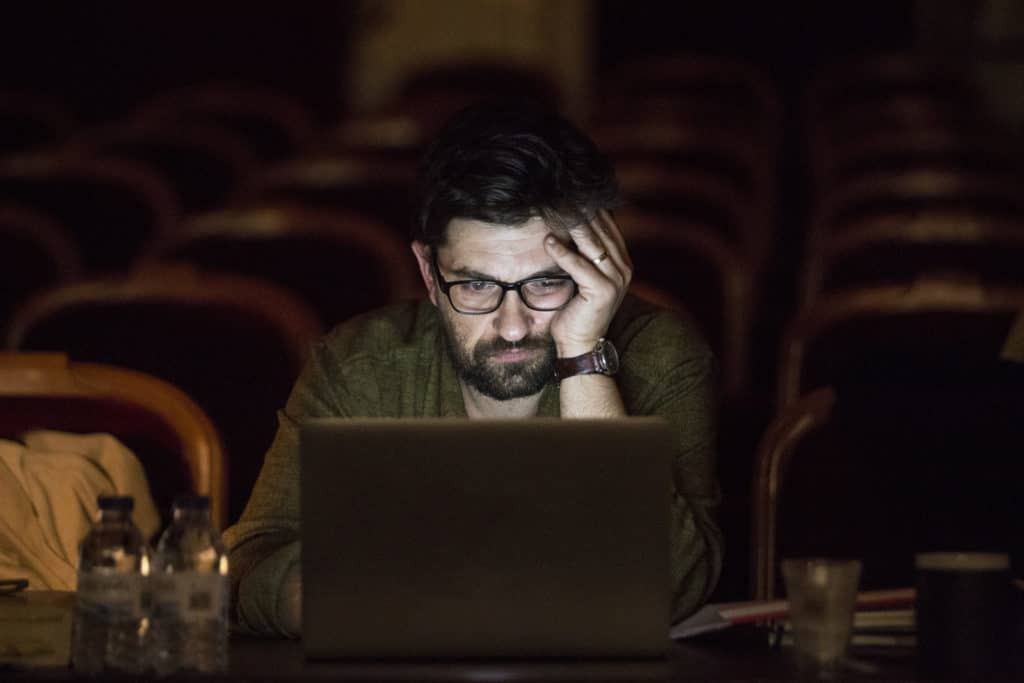
Tiago Rodrigues (1977), who joined the Flemish company tg Stan as a young actor and then also became a playwright and director, has now been the artistic director of the National Theatre D. Maria II in Lisbon for many years. He tours the world with performances such as By Heart (2014), Anthony and Cleopatra (2016) and Sopro (2018). His work, whose principles are strongly linked to Flemish and Dutch groups such as tg Stan, Dito Dito, De Koe, Dood Paard, Het Barre Land and finally its source, Discordia, has actually hardly been seen here.
'[The people of] Discordia are the grandparents, of course. I am very much influenced by tg Stan, worked with Dood Paard. My own work was shown at Frascati and the Rotterdam Schouwburg. I have also worked more often with Kaaitheater, but it's true that my international tours don't visit the low countries very regularly.'
How does the Brechtian premise - of the actor being central and remaining in dialogue with his role, never completely disappearing into the character, always lovingly maintaining a certain distance - still play a role in your work? It seems to have shaped you not only as an actor, but also as a writer and director.
'There is a very clear connection, although it is difficult to explain exactly. My way of writing for theatre is a response to my experiences as an actor, in the context of tg Stan and that wider theatre family in Belgium and the Netherlands. I started writing to continue my work as an actor, dealing with other people's texts and repertoire, what I had discovered therein. I write from the actor's point of view.'
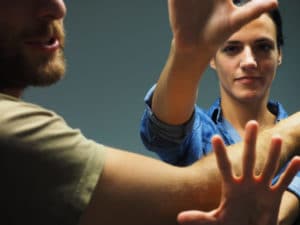
The role reversal and musical approach to the text in Anthony and Cleopatra very small deletions from identification arise all the time. Also because Sofia Dias and Vitor Roriz don't really play a role, it becomes a very subtle, fairly abstract, but somewhere very concrete play with changing perspectives, layers and translations.
'I always worked with the effect of translation. It was something natural in the way I wanted to be present as an actor. I only realised later what it meant. It is a game of transmission and appropriation ["a game of transmission and appropriation"]. Just like a translator, who focuses entirely on the original text, but becomes a writer himself in the translation. The same is true when translating to another medium. Actors translate texts that are on paper. That cannot be done other than through appropriation.'
'You show yourself through Chekhov, and the times you live in are also translated that way. That's why it's also important to conceive theatre very transparently. Not as something you hide in, in which you let the world of today disappear into another time or place. At the same time, that original text must also be brought very clearly, so that we can see ourselves and each other through it. The idea of translation needs transparency, so that you see the actor and there is also space for the audience to see themselves.'
'When I am in Sopro (2018) use the prompter, along with the actors, then I show the translation game. With Sofia and Vitor, who are dancers, their way of translating naturally had to come to the fore. I wanted to find exactly that translation play, which is related to their background, the incredible power that comes from their bodies and both their voices.'
Sofia Dias and Vitor Roriz said, after the performance in Lausanne, that at the beginning of your collaboration, they told you right away that they did not want to play a role. Contemporary dance has little to do with masking one's own body.
'Look, I never invited them to Anthony and Cleopatra to do. We wanted to work together, and then they said they wanted to do a text of mine, do text theatre. But also that they didn't want to play a role. I always work from affinity with people. The process is paramount, the mutual conversation. The collaboration with actors is the most important thing for me in developing the form of a performance. I work from such principles, not from a fixed method. It develops according to the process and the people you work with. I don't need to see myself reflected in the work. It's about seeing them as they are, as they would do a play.'
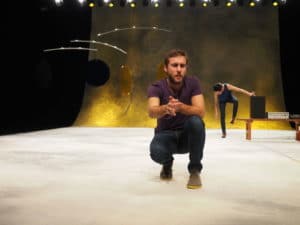
'So I had to start writing a text that matched their ideas. That's how I came to Anthony and Cleopatra out. It is a later play by Shakespeare, rather strange and impossible. It thematises putting yourself in the other, wanting to become the other. This applies in several ways to the two main characters, because of their love, but also in terms of their social status, male and female roles, east and west, ect. Plutarchus writes very nicely that, after Anthonius and Cleopatra, love is about the ability to see the world through the sensibility of the other. Which can also be understood very politically, especially today. It's a wonderful definition of what translation can be, and performing in theatre, through a character or otherwise.'
They also said you tricked them with this text.
'They were really afraid of having to do someone else on stage, playing a role. You can take that as a misconception of theatre, but of course, as a scion in the lineage of tg Stan and Discordia, I completely agreed with them. So that paradox became the subject of our collaboration. If you have trouble with the dramatic portrayal of great characters, why not get right down to the gigantic legacy of Anthonius and Cleopatra? It is my favourite Shakespeare because of its impossibility, with super great action and characters, priceless if you wanted to perform it faithfully. It has everything you fear or dislike about it.'
'So we read Shakespeare aloud, talked to the Portuguese translator about the play and the famous Cleopatra (1963) by Mankiewicz, and then, after letting it rest for a few weeks, I asked Vitor and Sofia to remember the story, out loud, from memory. I made notes of that and started organising them. The first pages of text I wrote still open the show.'
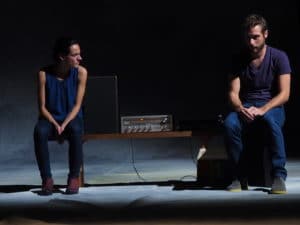
'As performers, of course, they are terribly detailed and methodical because of their dance background. Very different from my way of acting. In my writing, I started to organise their approach, to compose, as you might do with music. And because there were only two of them, describing their environment, the situations and all the relationships between characters came naturally. It became their story. And eventually I did indeed write a piece in which they very, very slowly get to something like play, and for a moment become Cleopatra and Athononius, even though they didn't want to.'
'And then there is the choice that they are each obsessed with the other's character. Vitor with Cleopatra, Sofia with Anthony. Which is related to being a couple - of the characters, of themselves, of Richard Burton and Elisabeth Taylor.'
'Every day I wrote new lyrics, and rewrote lyrics. I called it songs, not scenes, because that would have blocked them. So that it was mostly about rhythm, about singing. Which in turn influenced me in my way of writing. It is also special to see, even though this plays no role for the audience, that the piece as a whole reflects our joint process. Where we stood at the beginning and where we came out just before the premiere, when they were finally able to be carried away by emotions while doing a dialogue. What we never imagined when we started.'
'I very much like what dancers do with text. I did a lot at PARTS taught, and that experience helped me a lot in creating this piece. Dancers have a certain freedom in how they relate to text, in relation to the conventions and codes of text theatre. That freedom totally compensates for any technical deficiencies in the treatment of text. You can easily solve those. Like, for instance Cynthia Loemij, the Rosas dancer, who is among my favourite actors ever, because of what she does in Quartett at Stan.’
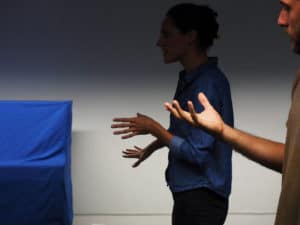
Isn't it a huge clash between the search for the ideal measure in choreography, think of De Keersmaeker, for example, and the work of actors and directors you are so related to, where that very measure is questioned all the time, destroyed or at least tested on stage, in front of the audience? It's the kind of risk you see few dance makers taking.
'That process of testing was in our working process. It's about freedom and convention. That I wrote during the process, for the experience we went through together, while rehearsing, without knowing exactly where I would end up, is a huge risk. But it was also the source for the inventions we made together. When I wrote "Anthony enters the palace", it didn't feel right, like a theatrical cliché. So it became "enters the present" and that was much better. We also tried "entered the theatre", but that became too meta, like the anti-palace. That didn't fit either.'
'The play is less about theatre, more about telling a story, how to make space for that. The telling always happens in the here and now. So when you say "two hundred years ago", or "once upon a time", you are in the now and evoking that past. Evoking experience, evocation, has become an important motif. Choosing the moment to transition from speaking in the third person to the first and second person, that they start saying "you" and "me", was also very exciting. And then at the end of the play they would also die, totally complicated.'
'So basically we do 45 minutes, so they can play someone else and then we're gone very quickly, so they don't have to pretend to die on stage. It's actually one very slow inward movement they make with the audience: from afar they approach Shakespeare, Rome and Alexandria, history, the past, the collective consciousness, never actually appropriating anything, because they never pretend to be Anthony and Cleopatra. Rather, it happens to them, through the text, as if you suddenly do the voice of the bear when you read to your child. And even then, they keep taking a step back. So that the audience stays with the now of the telling, though of course the play speculates on identification and illusion.'
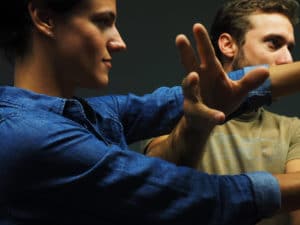
'I have no problem if spectators want to see Anthony and Cleopatra from the very first moment. We also speculate on that expectation by calling the play that, but that remains the spectator's freedom. But for me, it's about something else. I wanted to harness the power of Vitor and Sofia. Show how to tell the story without falling into sentimental tricks. And at the same time, we absolutely did not want a cynical story, which would exclude or avoid any kind of emotion.'
'It's about the rules of the game, which you invent by working together. I am not in the business of developing my aesthetic or formal method further, with a clearly predictable outcome. It is rather about small discoveries, which you make along the way and which stem from principles, to trust, to surrender to. Even if that always results in completely different vocabularies, articulations and artistic proposals. I believe more in research than in industry. It's about deepening the principles. Other people have a dream one good night and then spend three months working on it. I can have enormous respect for that, but that's not how I work.'
But when you watch the performance, there seems to be a very precise aesthetic underlying it: the modesty with which Vitor and Sofia stand on stage and do the lyrics, the lyrical way they deploy their bodies and move through the text, without ever really coinciding with it, that is so specific and moving ...
'But look, what you see as an aesthetic choice, an artistic proposal, is stupidly the outcome of collaboration, of who they are. So I tried to write a text for who they are, and how they wanted to interact with text. So I made it descriptive, narrative. But it's also because they don't do actor things, they don't use lyrics to go out of their way or bring out a certain meaning. For them, it's like music.'
'Whoever I work with, a risk I always try to take, even if it's frightening, is that I don't know beforehand what a piece will eventually look like, what shape it will take. You have your own principles, you adapt to other people's principles. For example, I don't like rehearsing endlessly, disciplining your body, the repetition, so that you master it technically. But Vitor and Sofia wanted that very much, from their background as dance people, but also because of the text, which they are not used to, to gain confidence. My way of dealing with that, then, was to rewrite over and over again. It's also why I left the set so empty, so they couldn't lose themselves in it, and every movement was in relation to the other.'
Did Sofia and Vitor as dance artists give you any new insights, in this study?
'No. The play is about them. About how they move, their arms, their physicality. That has come to play a role in my work for them.'
But there is a very special flow to it Anthony and Cleopatra, something I've never seen before in saw a choreographic work. But it is also far removed from the clownish interruption and anarchic kitchen table dramaturgy, if anything im frage.
'Well, the play has a certain rigoeur, a certain rigour that has to do with Vitor and Sofia's background. But when I look at my own work in recent years, it moves between the imperfection of actors thinking out loud on stage, a certain roughness that comes with lots of angles, ups & downs, irregularity, and other work that is fairly elegant, with a more methodical use of space.'
‘Sopro has a few explosive moments, for example, because of the actors' anarchic, clownish freedom, but much of it is reasonably controlled, because the role of the prompter allows it. I learned to enjoy that: instead of the theatrical whirlwind, a light breeze circulates on stage. More fluid and flowing. Which is purely to do with my collaborations. I'm not going to force the souffleuse to become a Flemish actor. The theatre she has grown up with, within that I try to find freedom.'
'And in terms of using space: I think about that, but I would never set it down. I do have an obsession with time, and timing. I'm very precise about that. So Vitor and Sofia can do whatever they want in terms of use of space, but in terms of duration, for me every element has a very precise time-frame, "and then it dies". I am also very precise with arrivals and departures: are you exactly on time, or just too late, or way too early? Does that create an interesting or an unnecessary problem, with the text or with the play? And the dynamics of scenes, whether they go fast or slow. That is perhaps my relationship with choreography, also in terms of light and sound. Time is something that in a lot of theatre is perhaps handled a bit easily.'
Playing the play in a foreign language (in French in Lausanne, in English in Amsterdam) almost seems to add to the special sensitivity the three of you have achieved.
'Direct contact with the audience is for me, as an actor and as a director, the most important thing there is in the experience of theatre. That a direct link is created. Sometimes that is not possible, and subtitling is a good solution as with Sopro. We could have translated it into English and French, but the play is so rooted in Portuguese stories, fictional and documentary, that it adds extra dramaturgical value.'
'But in the case of Anthony and Cleopatra - we tried it out in Avignon, where they make a point of showing work in the original language - I find that with subtitles or surtitles, the text and the author become too dominant. The text is very poetic. The repetition, the repetitions and doublings, give it a formal quality, reflect a radical choice. When you see that projected and have to read it, the author's position dominates. As a spectator, you are constantly confronted with his choices. It becomes difficult to see the actors as anything other than figures serving the text.'
'When you don't have to read, and as a spectator you can focus directly on the performers, take in their whole presence, the text becomes part of their body, becomes their language despite its radical form. Then it can become light and musical, the repetition can enchant, like a mantra.'
Athony and Cleopatra by Tiago Rodrigues can be seen on 4 and 5 June during the Holland Festival, at Theater Frascati, at 21:00. Information. Website.
